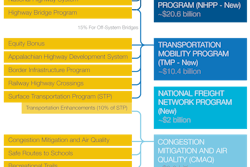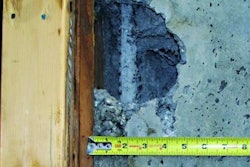President Barack Obama signed into law today a spending package that Congress passed Thursday, which includes Fiscal Year 2012 appropriations for the U.S. Department of Transportation. The bill, adopted 70-30 by the Senate and 298-121 by the House of Representatives, reduces the highway obligation limit by nearly $2 billion -- a 4.8% reduction from last year's level -- and adds substantial additional funding for emergency relief.
In addition to transportation, the conference committee report for HR 2112 approved by both chambers Thursday includes full-year FY 2012 funding for housing; commerce, justice, and science; and agriculture, food, and drugs. The bill also includes a continuing resolution to fund all other government agencies from Saturday to Dec. 16. The federal fiscal year began Oct. 1; the U.S. Department of Transportation and other agencies have been operating under a continuing resolution at FY 2011 funding levels minus a small reduction.
The conference report lowers the highway obligation limitation from $41.107 billion to $39.144 billion, a reduction of $1.963 billion. The enacted version adds $1.662 billion in appropriations for emergency relief highway funding.
For the Federal Transit Administration, the final bill includes an FY 2012 obligation limitation of $8.361 billion for formula funding and bus grants, a New Starts/Small Starts capital program appropriation of $1.955 billion, and $150 million for grants to the Washington Metropolitan Area Transit Authority. The conference agreement contains no funding for "TIGGER" grants for energy and greenhouse-gas reduction such as those awarded this week by FTA. (see related story)
An appropriation of $9.653 billion is provided for Federal Aviation Administration operations and $2.731 billion for FAA procurement and capital projects. The legislation cuts the obligation limitation on the Airport Improvement Program from $3.515 billion to $3.350 billion, a 4.7% cut.
The conference agreement contains no funding for high-speed and intercity passenger rail grants. The Senate had sought $100 million to supplement previous years' rail allocations, but conceded to the House's demands to zero it out for the current fiscal year.
Amtrak receives $1.439 billion from the appropriations bill as enacted, down about $64 million from last fiscal year.
Congress maintained the administration's Transportation Investments Generating Economic Recovery discretionary transportation grant program, which has been extremely popular with states and localities in the past two years, receiving applications for projects well in excess of the funding available. (see related story) The fourth round of TIGER grants will be for a total of $500 million, down from $527 million last fiscal year. The House attempted to end the program, but conceded to the Senate's demand to keep it funded.
Another provision in the final bill extends for 20 years an expired truck weight exemption in Maine and Vermont, raising the limit on interstates from 80,000 to 100,000 pounds.



















